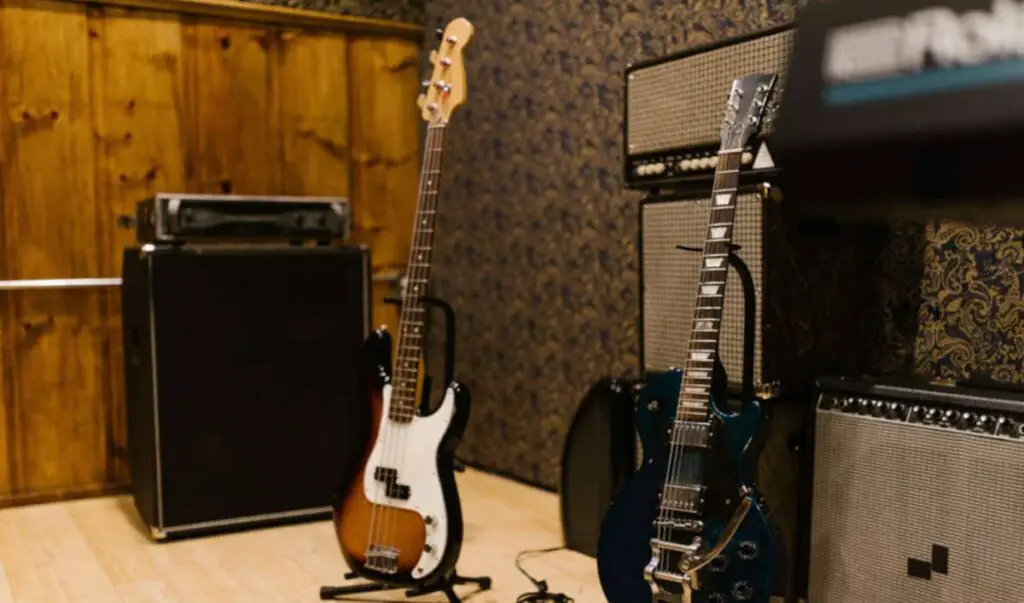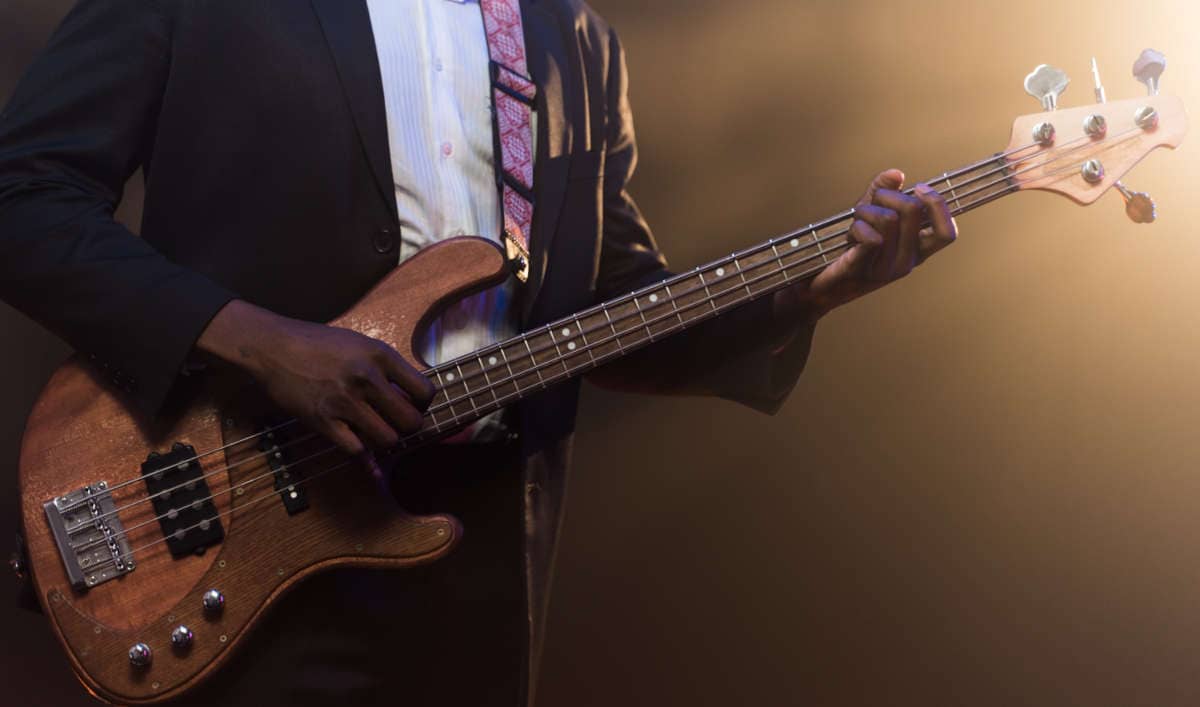Before I picked up the bass, it was an instrument I didn’t pay much attention to. Why play bass guitar when there are so many cooler instruments to play out there? Thus, I picked up the keyboard as my first instrument.
A year or so later though, I heard a bass solo by Geddy Lee of Rush, which changed everything. Soon afterward I wished for a bass guitar for my birthday, and I still play that old Yamaha from time to time 14 years later.
If you are asking yourself, “why should I play bass guitar”? chances are that you are not as blown away by the instrument as I was. You are considering playing bass, but are not sure what it entails, if it will be fun, and whether it’s a suitable instrument for you or not.
I have written this guide to help you find answers to these questions. It will teach you all you need to know about what being a bassist entails and whether it suits you. As a result, you will find the answer to whether you should play the bass, and how to go about it if you do decide to pick it up.
Is bass boring to play?
In general, musicians who commit to playing bass enjoy playing the instrument. Having to be in synch with both the rhythmic and harmonic sections of a band as well as the vast array of techniques that is possible on the bass makes it a fun and versatile instrument choice.
A common misconception is that the bass is a simple instrument. While some basslines are less complex than others, there is a lot that goes into writing and playing a great one. There is also a lot of room to develop and experiment with your tone, technique, and accenting.
Playing bass alone is fun, but it’s an instrument that you will draw the most enjoyment from when playing with a band. This is because great basslines are written to elevate a band as a whole, rather than just being a groovy individual part.
Furthermore, it is up to the bassist to decide when a song requires a simple bass line, and when it needs a groovy or harmonically complex one. Doing this well requires experience, a good ear, and maturity. I can tell you from experience that developing and applying these skills can be incredibly fun and fulfilling.
Some great bassists have incorporated tapping, chords, sweep picking, and octave tapping into their playing. Not only are these fun and challenging techniques to learn. It`s also a challenge of its own to find spots where they can be applied in a band setting.
Depending on the genre bass parts can feel repetitive as the bass often holds the same groove for longer periods of a song. Locking into a groove with the drummer and feeling the music build up throughout a song can be fulfilling and fun. However, if you quickly become bored of playing the same part over again, the bass could be an unfit instrument choice.
Lastly, the bass can also be incredibly fun when played as a solo instrument. Watch this short bass solo by Flea from the Red Hot Chili Peppers below to see how.
Benefits of playing bass guitar
Throughout my career, I have reaped many benefits from choosing the bass as my main instrument. Truthfully, I didn’t expect many of these advantages when I started out, but they are surprisingly common. If you pick up the bass, here are 3 of the key benefits you will reap:
1. Easier to find a band
When it comes to popular instruments, guitar and drums are often at the top, while the bass is not even mentioned.
For us, this is great news as it means bassists are in-demand and thus makes it easier to find a band.
After playing in metal, indie-rock, and hip-hop act, I have faced very little competition for the bassist spot. Most bassists share a similar journey, and you will always have job security and people to play with.
2. Defining a band’s sound
Some claim that it’s hard to hear the bass, but they are still certainly feeling it.
This is because its deeper frequencies create the foundation that all the other instruments base their sound on. Because of this, you as a bassist have a lot of control over the sound of your band.
If the other members in your band are not following you, everything is going to quickly fall apart. As a result, you can pull any band’s sound in the direction that you want.
3. You will become a more versatile musician
In order to work well with every part of a band, you also need to understand how the entire band works.
Playing bass well thus requires you to understand both the percussive and harmonic elements in a song. You also need to understand how instruments impact each other’s sound.
As a result, playing bass will greatly improve your musical knowledge and understanding, as well as your composing abilities.

Is bass easier than guitar?
In general, the bass is a more beginner-friendly instrument than the guitar. However, at a more advanced level, the two instruments require a different type of skill set, making them incomparable in terms of difficulty.
I can tell you from experience that the fundamentals of playing bass are easier than that of the guitar. For a beginner, switching between chords and controlling multiple strings is more demanding than playing one note at a time.
Thus, when comparing the bass vs the guitar, the bass wins out in terms of beginner-friendliness.
“I tried the guitar, but it had two strings too many. It was just too complicated, man! Plus, I grew up with Steve Cropper. There were so many good guitar players, another one wasn’t needed. What was needed was a bass.”
– Donald Dunn, Multi instrumentalist, producer and songwriter
However, at an intermediate stage, both instruments start to become challenging in their own ways.
As you advance your bass playing you will start to play more complex grooves and develop a more dynamic play style. Playing in a lower register requires you to move smoothly between notes and pluck strings methodically to make your lines groovy. It is also paramount that you are able to keep unplayed strings muted.
This will take a lot of control that can only be developed over time, and makes the bass hard to learn past beginner stages.
You also need to understand how your basslines impact the other instruments in a band. Small changes can make or break what the drums or guitars are doing. This is another difficult skill that bassists have to master in a different way than guitar players.
Guitar requires a different type of control over both your fretting and plucking hand. You also need to focus on how to create melodies and riffs as opposed to grooves. Depending on the genre, you might also need to become technically proficient enough to play solos.
Unless we are talking about the ease of starting out, bass and guitar are too different to compare in difficulty. Both instruments are going to pose different challenges and will require a lot of effort to become great at.

Does the bass suit you?
The bass is not for everyone. Anyone can pick up the 4-string; sticking with it long-term and playing in a band is something else.
Thus, If you are wondering whether you are suited to be a bassist, consider these 3 factors.
1. Ego
In order to succeed as a bassist, you will need to put your ego aside which requires a certain type of personality.
You need to be mature, understanding, and willing to serve the song. Playing the 4-string is all about making others look good, and the hard work you put in can get overlooked.
If this sounds like a nightmare, playing bass could end up feeling unrewarding down the road. If you don`t mind, or even like the idea of filling this role, the bass could be a great fit.
2. Responsibility
Bassists have a big impact on how a band sounds.
There is no better feeling than making all the instruments in a band work well together. On the other hand, I also felt completely disheartened when I failed at it. Playing bass in a band means that people are relying on you to make them sound good, and is a big responsibility.
Thus, the bass is well suited for you anyone who thrives on people relying on them and who enjoys seeing their friends thrive.
3. Size
A bass guitar`s dimensions are noticeably bigger than that of the guitar, and a long-scale bass has a scale length of 34″, or 86cm.
Due to being so big and generally having 4 strings, the strings will also be wider apart than on the guitar. Thus, depending on your physiology, the bass can be painful and difficult to play.
Luckily, if you have small hands or find the size of the instrument uncomfortable, there is a solution. Instead of giving up on the 4-string, consider a short-scale bass.
These are basses that have a scale length of 31″ (79cm) or less. The most successful bassist of all time played one, and it could potentially save you from giving up on the bass.

Is playing bass expensive?
In general, a good entry-level 4-string bass will cost around $200-$400, with cost-effective alternatives costing $100 and up. A portable mini amp intended for solo practice is about $30, while an amp intended for playing with a band generally costs $200-$300.
Playing bass is more expensive than playing guitar. This is due to bass guitars being less in demand, and because it’s a bigger instrument.
Starting out with bass will generally cost you between $200 and $600. This cost will be slightly higher if you are looking to play a 5-string, and even more so for a 6-string bass.
If you don’t care for quality or can get a good deal on a used bass, expect to pay between $100 and $200. While it’s possible to play bass without an amp, I also recommend getting a $30 mini amp for solo practice. This is because you want to familiarize yourself with how the bass sounds, and how your playing affects its tone when amplified.
You can also opt for a beginner set. Generally, this means a bass, a strap, an instrument cable, and an instrument bag. I recommend this set from Goplus on Amazon for anyone who is just looking to get started as cheaply as possible.
If you want a good entry-level bass and need an amp in order to play with a band, expect to pay $400 to $700. If I were to start over and wanted a good and versatile beginner bass, I would go with the Ibanez GSR 4. It’s lightweight and easy to play, and will thus make it easier for you to start playing the bass while still getting a great sound.
As for amps, most of them will do the trick. However, you will need at least a 50w amp to play with a band, with a 100w being preferable. I started out with an 80w Behringer, and it did the trick for band rehearsals and smaller concerts.
If you do not pick up a beginner bass set, you will also need to purchase the following. You can get all these items cheap, with a total cost of around $50:
- Instrument bag
- Pick
- Instrument cable
- Strap
Another cost to consider is string changes. A new set of nickelwound bass strings will typically cost around $20.
In time, your strings will start having a harder time staying in tune and begin losing their sound. Strings can also break while playing or tuning your bass. It’s a good idea to change your strings every 6 months, and at the very least once a year.

Playing bass in a band
Bass is an instrument that truly shines when it is played with other musicians.
Finding a band as a bassist is easy, but playing in one is challenging. Thus, whether you should play bass in a band or not depends on how intrigued you are by doing these two tasks:
1. Working with the drummer
In most modern music, the rhythm section consists of a bassist and a drummer. This also means that whether the bassist and drummer are in sync or not can make or break a band.
If the drummer plays the bass drum when you are not playing or accenting notes on the bass, you essentially have two low-frequency instruments fighting each other. This will sound messy and make it difficult for the other members of the band to play on top.
A bassist can thus easily ruin a great drum beat, and a drummer can ruin a great bass line. Therefore, you need to be aware of each other, work together, and think of yourselves as one big instrument.
2. Laying the harmonic foundation
The bass seldom plays chords, but chords are always based on the bass.
As humans, we cannot avoid basing our sense of harmony on the lowest note we hear. Thus, harmonies are always based on the bass in every type of music.
Something many musicians overlook is that when a guitar player writes a chord progression the bassist still has a lot of say in what should happen harmonically. You can elect to just play the root note of the chords. You can also play other notes, such as the 3rd or the 5th. Because of this you always have a lot of options in how you chose to lay the harmonic foundation.
This is more apparent in genres like funk and jazz than in metal and punk. Despite how obvious it may or may not be, every bassist in every genre is always filling these two roles.
You should play the bass in a band if you can see yourself handling and enjoying these tasks. You will have a lot of freedom in how you go about it, but it’s always going to be a big part of your job.
Conclusion
Should you play bass guitar? If you enjoy deep grooves and want to influence how every member of a band sounds then absolutely.
The bass is a more complex and fulfilling instrument than many tend to give it credit for. In reality, it takes a lot of rhythmic and harmonic understanding to succeed at it. It also takes great communication skills, understanding of your bandmates, and willingness to put your ego aside.
If you are asking yourself: “Then why play bass guitar? All that just sounds boring and stressful?” you might be better off choosing a different instrument. However, if you find these complexities and challenges intriguing and inspiring, you absolutely should.
Lastly, before buying your first bass I recommend getting an idea of what you are paying for. I have previously written about what makes an expensive bass expensive. I recommend taking a look at that article before purchasing your first bass so you don’t waste your money.

